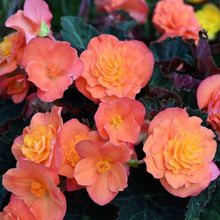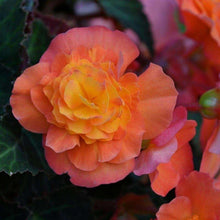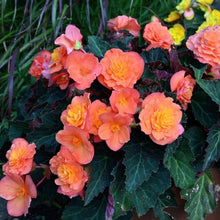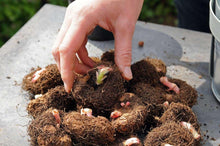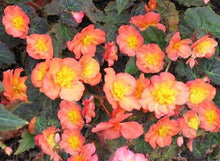
Tuberous begonia, rich and long-flowering. Beautiful, double orange flowers with a yellow center. The underside of the flower has a hint of pink which shines through on the outer petals. Contrasts beautifully with the dark foliage. Flowering time from June until frost, provided they are regularly supplied with water and plant food. It likes humidity and is very sensitive to cold weather.
Known for their wonderful ability to grow in the shade, small habit and lush green foliage, these tubers make a great addition to shady gardens and borders. In this article, we’ll review the advantages of using these beauties in your garden, as well as different planting techniques and tips for growing them. The Begonia multiflora variety includes Multiple Flowering varieties with smaller, numerous blooms.
This one has beautiful light pink, apricot orange and pastel yellow flowers.
Height: 20 cm
Planting season: Spring
Flowering time: June to September
Planting depth: 2-3 cm
Bulb Spacing: 15 cm
Hardy in USDA zones: 9-11
Light Requirements: Full sun to full shade
Soil moisture: Average
Naturalising: No
Deer/Rodent resistant: Yes
Pet safe: No
See all of our summer-flowering bulbs here: https://www.etsy.com/shop/terracegardenfrance/?etsrc=sdt§ion_id=33401009
CARE
Unlike most bulbs that have pointed tips, Begonias are bowl-shaped and have a hollow spot at the top. The more rounded side should be planted facing downwards. The tuberous bulbs are easy to grow, but they don’t like soggy conditions, so choose a spot in the garden with well-drained soil or a free-draining potting mixture. Your Begonias will want light shade and protection from harsh winds.
When choosing the tubers, be sure to check for firmness and look for those with tiny sprouts on the upper, concave surfaces. This is a good sign that they are healthy and ready to begin growing!
How to plant Begonia tubers:
Begonias are tender bulbs and require protection from frost. For best results, start them off in temporary pots in a greenhouse in March or April to give them a head start. They can then be transplanted outside in May.
Begonia tubers can also be planted directly outside into borders or containers in May.
When planting in containers, multipurpose compost is the ideal choice of growing medium.
Plant the tubers shallowly with the dipped side facing upwards – the top of the tuber should be around 1-2cm below the soil surface.
Planting them too deep will only encourage rotting. Water well after planting to “wake up” the tubers but then not again until you see growth, which usually takes 4-6 weeks.
Space the tubers around 15-20 apart from each other in a container display, or 20-30cm apart in borders.
Water thoroughly after planting and water regularly while in full growth. Don’t allow them to sit in wet soil while still dormant.
Plant your begonia tubers in spring and grow on in frost-free conditions or plant straight outside after risk of frost has passed
Grow in borders or containers in full sun or partial shade
Plant the tubers shallowly covered by about 1cm of soil
Space the tubers about 10-15cm apart
Plant with the concave side facing upwards
Water-in after planting and keep hydrated while in growth
While Begonias do best out of direct sunlight, they do like good light. A spot that gets morning sun will suit them well, or they can be grown in bright, filtered light indoors or out.
Keep pinching out dead flowers to extend the flowering season and to keep the display looking fresh.
Wait until frost is forecast or for the plants to become dormant before lifting and storing the tubers. For pot displays, you can just discontinue watering and store the pot away until next spring.





